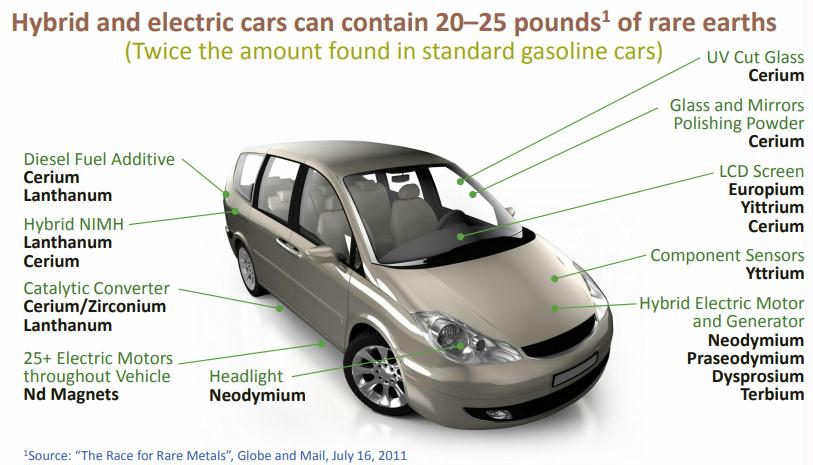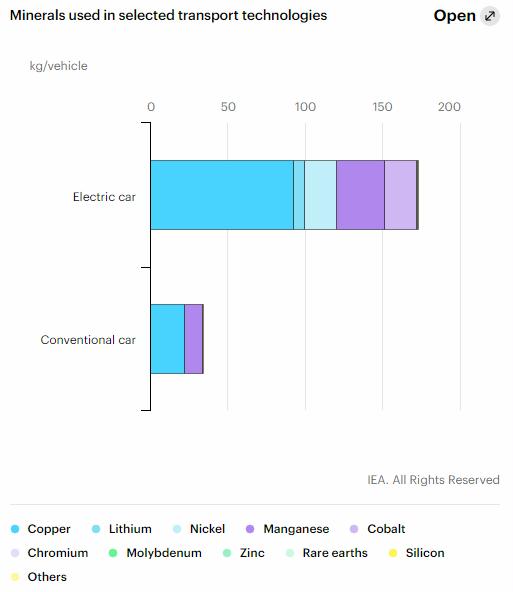
An electric car uses five times as many minerals as a conventional car (IEA 2020):

IEA, Minerals used in selected power generation technologies, IEA, Paris https://www.iea.org/data-and-statistics/charts/minerals-used-in-selected-power-generation-technologies
There are 17 rare earth elements (REE) that China controls up to 97% of (Klare 2012, Shumsky 2011). These are essential for transitioning to so-called green energy — not just cars but solar panels, windmills, solar photovoltaic, computers, electronics, the smart grid and more.
While we can import oil from dozens of nations, REE make us dependent on China, and China is also constructing mines all over the world — it’s as if Saudi Arabia bought up all the remaining oil fields.
Mining is the second most toxic, environmentally damaging industry on earth. So whatever the cost may be, no matter how high, let the Chinese destroy their land. It’s a cheaper price to pay rather than destroy our own nation’s precious topsoil, which in the long run is the most valuable possession we have.
Already 20% of China’s arable land is polluted with toxic heavy metals from mining and industry. Plus since conventional oil peaked in 2018, why would we bother to do this, since all of these contraptions are utterly dependent on oil, coal, and gasoline to be constructed for every step of their life cycle? By the time even a small fraction of our vehicle fleet could be electrified, since it lasts ten to forty years (diesel trucks), and new vehicles are unaffordable for 90% of Americans, the oil age will long be gone and we will have wasted precious time and energy on mining when we could have been insulating homes, conserving energy, and converting industrial agriculture to organic..
In 2011, nine of the REE were used in cars. Some EV car motors use REE elements neodymium, terbium, or dysprosium in their magnet motor. Each electric Prius motor requires 1 kilogram (2.2 lb) of neodymium, and each battery uses 10 to 15 kg (22-33 lb) of lanthanum (Gorman 2009). Other EVs use induction motors with copper coils.
Cars using internal combustion engines also use precious and rare earth metals in their catalytic converter: palladium, rhodium, cerium, and/or platinum and the gasoline they burn oil was refined using rare earths, such as lanthanum and cerium, and critical elements like cobalt.
In addition, these applications use rare earth elements, i.e. metal alloys or production process, so cars may also have these as well: Aluminum and steel, ceramics, computer chips, electronics, LCD screen, light-emitting diodes.
If an electric car uses electricity & electric grid or GPS, then these REE and critical elements were indirectly used: Wind turbines (up to 150 kg neodymium & praseodymium per MW), Solar panels (indium, gallium), Photovoltaic cells (Germanium, silicon metal), Steel production (fluorspar, vanadium, Ytterbium), Nuclear power (Europium, Gadolinium, Cerium, Yttrium, Samarium, Erbium, Beryllium, Niodymium), Satellites (Niobium), Semi-conductors (gallium, Holmium), Semi-conductors (gallium, Holmium), Fiber optics (Germanium, Erbium Europium, Terbium, Yttrium), Electronics and electricity (Tungsten) and more.
Already, and increasingly, China controls REE from mining to final production of high-tech goods, and is likely to export REE less and less as they use them for their own high-value products. Until some point of oil decline that is…
And there simply aren’t enough minerals on earth:
- Antonio Turiel (2021) Some inconvenient questions: An open letter
- Simon P. Michaux (2021) The mining of Minerals and the Limits to growth video
2023 What is the Cost of Electric Vehicle Batteries?
Alice Friedemann www.energyskeptic.com Author of Life After Fossil Fuels: A Reality Check on Alternative Energy; When Trucks Stop Running: Energy and the Future of Transportation”, Barriers to Making Algal Biofuels, & “Crunch! Whole Grain Artisan Chips and Crackers”. Women in ecology Podcasts: WGBH, Financial Sense, Jore, Planet: Critical, Crazy Town, Collapse Chronicles, Derrick Jensen, Practical Prepping, Kunstler 253 &278, Peak Prosperity, Index of best energyskeptic posts
***
References
Gorman S. 2009. As hybrid cars gobble rare metals, shortage looms. Reuters.
IEA. 2020. Clean energy progress after the Covid-19 crisis will need reliable supplies of critical minerals. International Energy Agency.
Klare, M. 2012. The Race for what’s left. Picador
Shumsky, T. 2011. Testing Their Metals. Companies are searching for ways to reduce their need for increasingly scarce minerals. Wall Street Journal.

One Response to Autos need finite rare earth, critical, & precious metals